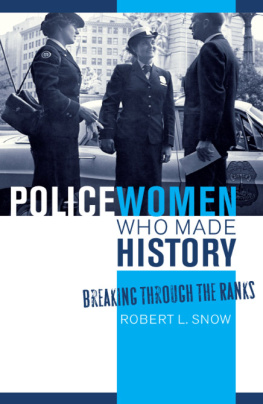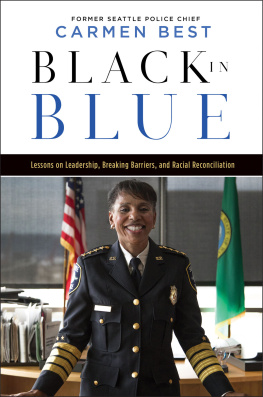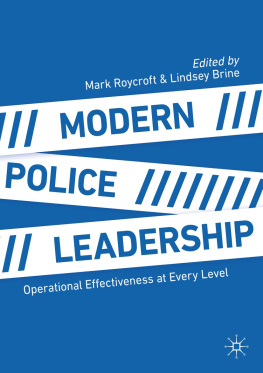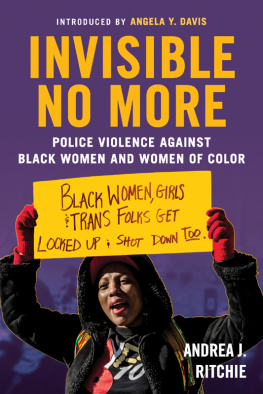First published by Willan Publishing 2003
This edition published by Routledge 2011
2 Park Square, Milton Park, Abingdon, Oxon OX14 4RN
711 Third Avenue, New York, NY 10017
Routledge is an imprint of the Taylor & Francis Group
Marisa Silvestri 2003
The right of Marisa Silvestri to be identified as the author of this book has been asserted by her in accordance with the Copyright, Designs and Patents Act of 1988.
All rights reserved; no part of this publication may be reproduced, stored in a retrieval system, or transmitted in any form or by any means, electronic, mechanical, photocopying, recording or otherwise without the prior written permission of the Publishers or a licence permitting copying in the UK issued by the Copyright Licensing Agency Ltd, 90 Tottenham Court Road, London W1P 9HE.
ISBN 13: 978-1-84392-046-5
British Library Cataloguing-in-Publication Data
A catalogue record for this book is available from the British Library
Typeset by TW Typesetting, Plymouth, Devon
Project management by Deer Park Productions, Tavistock, Devon
Acknowledgements
I am grateful to a number of people who have been involved in different ways and at various stages in the writing of this book. I owe a huge debt of thanks to Frances Heidensohn who has been and continues to be a mentor, critical commentator and a dear friend. She has consistently provided unwavering support throughout the development of this book. Given that, as my supervisor, she knew this work well in its previous life as doctoral work, her patience in reading various drafts is unsurpassable, as is her ability to continuously offer valuable observations and new insights. I am also grateful to friends and colleagues, Jennifer Brown, Chris Crowther, Sharon Pickering, Dorothy Schulz and Richard Wild who have generously given of their time by reading drafts and providing important advice and comments. I owe an especial debt of gratitude to Chris Crowther who has demonstrated an unfailing patience over the years, expending a considerable amount of effort to ensuring the realisation of this book.
I am also thankful to the various forums that have stimulated discussion and debate. In particular, I would like to thank the third Australasian Women and Policing Conference on Women Policing Globally, held in Canberra in October 2002, for kindly inviting me to share my thoughts and findings with them. Such an occasion provided a remarkable opportunity to explore the international experiences of policewomen it was also tremendously enjoyable. My appreciation also goes to the British Association of Women Police for being a wonderful resource, in particular, thanks to Irene Divine who has always responded to my queries so efficiently.
My thanks also go to my friends and colleagues, in particular, Brian Clark, Gary Fooks, Chris Gifford, Constantinos Phellas, Shaminder Takhar, Robert Cook and Carol Williams who have offered much moral support and provided meaningful and welcome distractions.The enduring support and encouragement of my parents and Annette has been fundamental, as was the help of Karola Quade in the early stages. More importantly, family assurances to purchase copies of the book will hopefully have a significant impact on increasing circulation figures. Especial thanks to Stef, for the many lost weekends, for tolerating the unpredictable emotions that accompany the process of writing and above all, for reminding me of the importance of life beyond work. Also, for his meticulous care in proof reading the bibliography. Thanks must also go to Brian Willan and the production team for ensuring the smooth passage of the book.
Lastly, the study itself would not have been possible without the pioneering policewomen who agreed to participate in this study. My thanks go to them for engendering a fascination within me to want to know more about the gendered nature of policing and power.
Although I have drawn on the help and work of others, it simply remains to say that the usual caveat applies: all responsibility for misguided interpretations or omissions that follow remain my own.
Chapter 1
Introduction
The gendered world of police leadership is the focus of this book. It comes at a time when calls are being made for a different kind of police leader to guide the police organisation through the twenty-first century. Pagon (2003: 167) notes that Different times call for different people. Not only has police work changed, so have the public and the communities into which it is separated Police leaders have to change themselves, their organisations and their people. It also comes at a time when we can see the face and faces of police leadership literally changing. In 2002, England and Wales could lay claim to four female chief constables, and twelve female assistant chiefs.1
The concept of change then is central to this book. Its enquiry has been shaped by two fundamental ideas about organisational change. First is the idea which suggests that by increasing the number of women in organisations greater and more sustainable forms of change will result (Itzen and Newman 1995). With reference to policing, there is a growing body of work which suggests that policewomen are engaged in the project of policing in a distinctly different way to their male counterparts (Homant and Kennedy 1985, Saunders and Size 1986, Bloch and Anderson 1974, Sherman 1975, Grennan 1987, Lunnenborg 1989, Prenzler 1997, Neiderhoffer 1974, Linden 1983, Spillar 1999). Second is the idea that leaders and managers have a significant role to play in bringing about change to organisations. This idea is central to current debates about change within policing. Police leaders have been awarded a pivotal role in driving forward organisational change (Adlam and Villiers 2003). More specifically, police leaders have been tasked with the job of developing ethical policing (Neyroud and Beckley 2001, Adlam and Villiers 2003, Alderson 2003, Bunyard 2003, Richards 2003, Quinton and Miller 2003). A combination of these ideas has led directly to the focus of this book that is, that women in police leadership positions may offer significant contributions to the project of organisational change within policing.
Women in leadership have come to be seen as both a symbol of and indeed a measure of organisational change. Affirming this, Walls (1998) historical study of chief constables ends in 1996, with the arrival of Pauline Clare, Britains first woman chief constable at Lancashire Constabulary. He notes the significance of 1996 as symbolising the end of the traditional symbolic male dominance of the office of chief constable, together with the end of patriarchy (ibid.: 6). Though Walls proposal that the appointment of a woman chief constable hails the end of the male dominance of the office is unquestionable, the idea that this signals the end of patriarchy may be somewhat premature and overstated. Nonetheless, this book is premised on the belief that things can and might be changing in the police organisation, and it is grounded in the idea that individuals are both creative and transformative agents (Giddens 1984), that despite structural constraints, individuals have the ability to bring about change, to make a difference.
Over the past few decades, there has been a proliferation of police research that has attempted to investigate and map out the nature and extent of organisational change in the police service. There is also a small but growing body of research that demonstrates the gendered nature of the police organisation. Instrumental in exposing the varied forms of discrimination that both men and women encounter in their work, such work remains firmly grounded in the argument that the cult of masculinity (Reiner 1992), characteristic of rank-and-file culture, is a prime culprit for womens continued exclusion from policing. Those at the top of the police organisation continue to remain relatively absent from academic discourse, with the majority of studies focusing almost exclusively on the lowest levels of the organisation, favouring the lives of the rank and file than those of their managerial counterparts.







